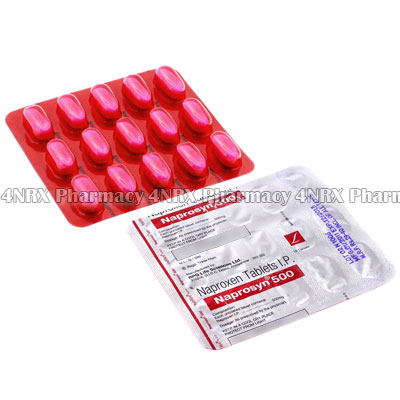 |
Home  Pain Pain  Naprosyn (Naproxen) Naprosyn (Naproxen) |
|
|||||||||
|
|
Naprosyn (Naproxen)
What is Naprosyn (Naproxen) used for? Naprosyn (Naproxen) a non-steroidal anti-inflammatory drug (NSAID) prescribed to treat patients suffering from osteoarthritis or rheumatoid arthritis. The medication suppresses the action of enzymes released in response to injury that cause swelling and irritation to allow more comfortable joint movement. This action also makes it useful for treating other inflammatory conditions such as ankylosing spondylitis, dysmenorrhea, or pain caused by injuries such as strains or sprains. Your physician may prescribe it to treat other unlisted conditions, as well. How should I use Naprosyn (Naproxen)? You should always take Naprosyn (Naproxen) according to your physician's instructions to get the most effective results from treatment. One tablet is typically administered two to three times each day, but your particular instructions will be determined by your health condition and the severity of your symptoms. These should be swallowed with a large glass of water and can be taken with or without food, but a meal or snack should be eaten before us if you experience an upset stomach. Never change the form of the tablets before use to avoid destroying or changing the effects of their contents. Ask your pharmacist or physician any questions you have about the medication to ensure the correct administration. What are the side effects of Naprosyn (Naproxen)? Some patients using Naprosyn (Naproxen) may experience side effects while undergoing treatment including:
Serious side effects that may occur requiring emergency medical attention are flu symptoms, sensitive skin, swelling, weight gain, chest pain, trouble breathing, severe skin reactions, coughing up blood, seizures, darkened urine, discolored stools, or jaundice. Immediately inform your physician about any conditions that become severe or worrying to make sure the correct changes are made to your dosage to prevent further complications. Please Note Do not use Naprosyn (Naproxen) if you have severe heart failure, an active ulcer, active intestinal bleeding, if you have had a bad reaction to other NSAID medications, or if the patient is under sixteen years old. It is also important to inform your physician if you are a smoker or have diabetes, heart failure, hypertension, inflammatory bowel disease, cerebrovascular disease, high cholesterol, history of asthma, allergies, systemic lupus, anti-clotting medications, or any intestinal disorders. These may cause unexpected problems requiring adjustments to your dosage or frequency of administration. Strictly follow all instructions provided to you by your physician or pharmacist while using Naprosyn (Naproxen). Optimum and safe dosage can differ based on the patient and the condition being treated. As this medication may be unsafe for certain patients, it is essential you always inform your physician if you are pregnant or breastfeeding, as well as if you have any allergies, other illnesses, or ongoing health conditions, and if you are taking any other form of medication, supplements, or herbal products. Immediately seek emergency medical care if you have an allergic or hypersensitive reaction. Common signs of a reaction include hives, swelling, skin rashes, chest pains, as well as trouble breathing or swallowing. 

|
||||||||||||||||||||||